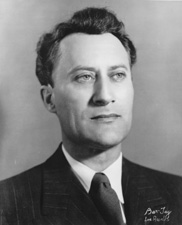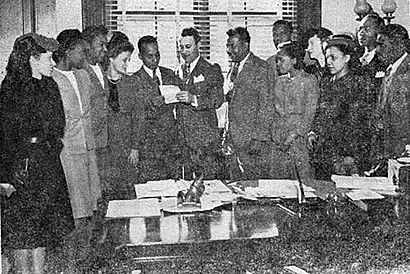Glen H. Taylor facts for kids
Quick facts for kids
Glen H. Taylor
|
|
|---|---|
 |
|
| United States Senator from Idaho |
|
| In office January 3, 1945 – January 3, 1951 |
|
| Preceded by | D. Worth Clark |
| Succeeded by | Herman Welker |
| Personal details | |
| Born |
Glen Hearst Taylor
April 12, 1904 Portland, Oregon, U.S. |
| Died | April 28, 1984 (aged 80) Burlingame, California, U.S. |
| Resting place | Skylawn Memorial Park San Mateo, California, U.S. |
| Political party | Democratic (before 1948, 1950 onwards) |
| Other political affiliations |
Progressive (1948–1949) |
| Children | 3 |
Glen Hearst Taylor (born April 12, 1904 – died April 28, 1984) was an interesting American politician from Idaho. He was a U.S. Senator and also an entertainer and businessman. Taylor was known for his unique style and strong beliefs. He was mostly a member of the Democratic Party. In 1948, he ran for Vice President with the Progressive Party. People considered him one of the most progressive (or liberal) senators of his time.
Contents
Early Life and Entertainment Career
Glen Taylor was born in Portland, Oregon, in 1904. He was one of thirteen children. His father was a preacher and former Texas ranger.
His family later settled near Kooskia, where Glen went to public schools. After finishing eighth grade in 1919, he joined his older brother's theater company. Between 1926 and 1944, he owned and managed different entertainment groups.
Glen Taylor was also a country-western singer. His older sister, Lena, became a famous jazz singer known as Lee Morse.
Taylor became interested in politics after reading books like The People's Corporation by King Camp Gillette. In 1935, he tried to start a new political party in Nevada and Montana.
Political Journey
By the late 1930s, Taylor lived in Pocatello, Idaho. His first attempt at politics was in 1938. He ran for a seat in the United States House of Representatives but did not win.
Running for the Senate
Taylor first ran for the United States Senate in 1940. He lost that election and another one in 1942. During these years, he worked as a painter's assistant and sheet metal worker in California.
In 1944, on his third try, Taylor finally won a Senate seat. He defeated the current Governor C. A. Bottolfsen. Before becoming a senator, Taylor had never traveled east of Chicago. He was the first professional actor elected to Congress.
"The Singing Cowboy" in Washington
In the Senate, Taylor became known as "The Singing Cowboy." He was famous for his unusual actions. When he arrived in Washington, D.C., he rode his horse, Nugget, up the steps of the U.S. Capitol building.
When Taylor moved to Washington in 1945, it was hard to find a home because of World War II. So, he stood outside the Capitol and sang, "O give us a home, near the Capitol dome, with a yard for two children to play..." This was to the tune of "Home on the Range." Soon after, he and his family found a place to live.
Taylor was appointed to the Committee on Banking and Currency. He told Senator Robert F. Wagner that he was qualified because he had accounts at several banks. In 1945, he suggested that the Senate support the idea of a "world republic."
In 1946, Taylor spoke about how large companies influenced politics. He believed they affected laws about prices and jobs.
Disagreements and Activism
In 1946, Taylor had a public disagreement with a Republican leader in Boise. This incident made national news.
Taylor also had arguments with other Idaho Democrats. He often criticized Charles C. Gossett, who became a senator in 1945. Taylor supported Gossett's opponent in the 1946 primary election.
In the Senate, Taylor often gave long speeches. He frequently criticized President Harry S. Truman's foreign policies. He believed the Truman Doctrine and the Marshall Plan could lead to war with the Soviet Union. Taylor was less critical of the Soviet Union than many of his colleagues.
Standing Up for Civil Rights

Glen Taylor was an early supporter of the Civil Rights Movement. As a senator, he openly opposed racial segregation. He pushed for equal rights for all people. He wanted to end discrimination in jobs, housing, voting, and the courts.
In 1946, he tried to stop Southern senators from blocking a bill. This bill would have made the Fair Employment Practices Committee permanent. This committee worked to prevent discrimination in jobs.
In 1947, Taylor asked the Senate to delay swearing in Senator Theodore G. Bilbo of Mississippi. Bilbo was known for his segregationist views. As a result, Bilbo was never officially seated for his final term.
In 1948, Taylor was arrested in Birmingham, Alabama. He tried to use a door meant for African Americans. This happened while he was going to a meeting of the Southern Negro Youth Congress. He was later found guilty of disorderly conduct.
Thoughts on UFOs
In July 1947, a reporter asked Taylor about reports of a UFO found near Roswell, New Mexico. Taylor said he almost hoped they were spaceships from another planet. He thought they "could end our petty arguments on earth."
He also said that no matter what the UFOs were, they "can't be laughed off." Taylor explained that if people didn't ease tensions, the world could become very stressed.
1948 Vice Presidential Run
In 1948, Taylor was chosen to run for Vice President. He joined former Vice President Henry A. Wallace on the Progressive Party ticket. Taylor knew this would make it hard for him to win his next Senate election.
The Wallace/Taylor ticket did not win any states. They received only 2.4 percent of the votes. This nomination caused some members of the Idaho Democratic Party to try to remove him, but they failed.
Reelection Attempt in 1950
In 1950, former Senator David Worth Clark ran against Taylor. Taylor's run with the Progressive Party made him seem very progressive in Idaho. This contributed to his defeat in the Democratic primary election. Taylor lost to Clark, who then lost to Republican Herman Welker in the general election.
Later Career and Business
After leaving the Senate, Taylor worked as president of a construction company from 1950 to 1952. He had to resign after being called a "security risk." This made it hard for the company to get government contracts. After this, he often had to work manual labor jobs.
He ran for the Senate again in 1954 but lost. His sixth and final attempt for the Senate was in 1956. He lost the Democratic primary to Frank Church. He then ran as a write-in candidate in the general election, getting 5.1 percent of the votes.
The Hairpiece Business
In 1958, Taylor and his wife Dora moved to Millbrae, California. They started making hairpieces by hand. Taylor had made one for himself in the early 1940s.
By 1960, their company, Taylor Topper Inc., became a major maker of hair replacements in the United States. Taylor once said that he started losing his hair at 18. He found that voters "didn't have much use for bald politicians." He won his fourth election after wearing a hairpiece.
His first hairpiece was made from a tin pie plate with felt and human hair. In 1958, he received a patent for his new product. Glen and Dora Taylor were very successful with their hairpiece business. The company, now called Taylormade Hair Replacement, is still active today.
Personal Life
Glen and Dora Taylor had three sons: Glen Arod, Paul Jon, and Greg.
Glen Taylor passed away in April 1984 at age 80. He died from complications related to Alzheimer's disease. Dora Taylor lived in San Mateo County until her death in 1997 at age 93. They are buried at Skylawn Memorial Park in San Mateo.
Filmography
Television
| Year | Title | Role | Notes |
|---|---|---|---|
| 1958–1961 | The Adventures of Ozzie and Harriet | Professor / Professor Higgins / Mr. Asher | 9 episodes |
| 1959 | Goodyear Theatre | N/A | Episode: "A Good Name" |
| 1960 | Death Valley Days | Colonel Adrian | Episode: "Yankee Confederate" |
Images for kids
See also
 In Spanish: Glen H. Taylor para niños
In Spanish: Glen H. Taylor para niños
 | Ernest Everett Just |
 | Mary Jackson |
 | Emmett Chappelle |
 | Marie Maynard Daly |


